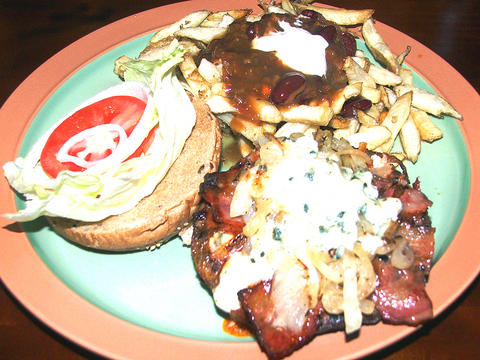Andrew Lunman had a dream. Like many long-term foreign residents who have grown tired of teaching, he wanted to open his own restaurant. So he started Bongos, a low-key North American-style place in Gonguan. That did pretty well, so last year he opened Coda, a slightly more upscale Italian-American restaurant in the same neighborhood. Business there hasn't been bad either. So now Lunman has taken on a new project and is helping Joe Hodgson with Hodgson's new gourmet burger restaurant, Forker's, which opened last month in an alley behind the California Fitness Center on Zhongxiao East Road.
The concept at Forkers is simple. Lure customers with a basic burger that, at NT$190 with a drink and two sides, doesn't seem much more expensive than a combo meal at a fast food restaurant. Then present said customer with a very long list of optional upgrades. How about a burger with mushrooms and cheese for NT$60 more, and Tex-Mex fajita fries for NT$40? Sounds reasonable. Only NT$30 extra for endless drink refills? Seems like a good deal. And why not drop another NT$80 on a deluxe patty made from imported Kobe beef? (The latter option will be available at the beginning of next year, Lunman says.)
It's hard to resist so many temptations. A few NT dollars here, a few NT dollars there, and soon you're spending a lot more than you originally intended. Not that you'll mind. Though the core products more than hold their own against the competition - the patties are well-seasoned and beefy, the fries are cut from unpeeled russets, not frozen potatoes - the upgrades are phenomenal.

PHOTO: RON BROWNLOW, TAIPEI TIMES
Take the monster burger (NT$270), for example. Served with red hot sauce, blue cheese, fried onions, bacon, lettuce, tomatoes and ranch dressing, it is the kind of Dagwood sandwich you probably dreamed of making one day when you were really, really hungry. In the wrong hands, it would be a mess, but Forkers gets the combination just right. Each bite delivers a burst of distinct flavors - tangy blue cheese, spicy hot sauce, creamy ranch dressing - and the burger holds itself together neatly until the end. The bun doesn't break, the patty doesn't separate itself from the toppings, and the sauce don't ooze out and get all over your hands.
The menu lists more than 30 souped-up burgers like this one. And then there's the restaurant's signature dishes, which are called, of course, the forkers. These are open-faced hamburgers topped with things like poutine or spaghetti.
On Sunday, Feb. 3, 2008, everything at Forkers will be priced 25 percent off.

Towering high above Taiwan’s capital city at 508 meters, Taipei 101 dominates the skyline. The earthquake-proof skyscraper of steel and glass has captured the imagination of professional rock climber Alex Honnold for more than a decade. Tomorrow morning, he will climb it in his signature free solo style — without ropes or protective equipment. And Netflix will broadcast it — live. The event’s announcement has drawn both excitement and trepidation, as well as some concerns over the ethical implications of attempting such a high-risk endeavor on live broadcast. Many have questioned Honnold’s desire to continues his free-solo climbs now that he’s a

As Taiwan’s second most populous city, Taichung looms large in the electoral map. Taiwanese political commentators describe it — along with neighboring Changhua County — as Taiwan’s “swing states” (搖擺州), which is a curious direct borrowing from American election terminology. In the early post-Martial Law era, Taichung was referred to as a “desert of democracy” because while the Democratic Progressive Party (DPP) was winning elections in the north and south, Taichung remained staunchly loyal to the Chinese Nationalist Party (KMT). That changed over time, but in both Changhua and Taichung, the DPP still suffers from a “one-term curse,” with the

Jan. 26 to Feb. 1 Nearly 90 years after it was last recorded, the Basay language was taught in a classroom for the first time in September last year. Over the following three months, students learned its sounds along with the customs and folktales of the Ketagalan people, who once spoke it across northern Taiwan. Although each Ketagalan settlement had its own language, Basay functioned as a common trade language. By the late 19th century, it had largely fallen out of daily use as speakers shifted to Hoklo (commonly known as Taiwanese), surviving only in fragments remembered by the elderly. In

Lines between cop and criminal get murky in Joe Carnahan’s The Rip, a crime thriller set across one foggy Miami night, starring Matt Damon and Ben Affleck. Damon and Affleck, of course, are so closely associated with Boston — most recently they produced the 2024 heist movie The Instigators there — that a detour to South Florida puts them, a little awkwardly, in an entirely different movie landscape. This is Miami Vice territory or Elmore Leonard Land, not Southie or The Town. In The Rip, they play Miami narcotics officers who come upon a cartel stash house that Lt. Dane Dumars (Damon)